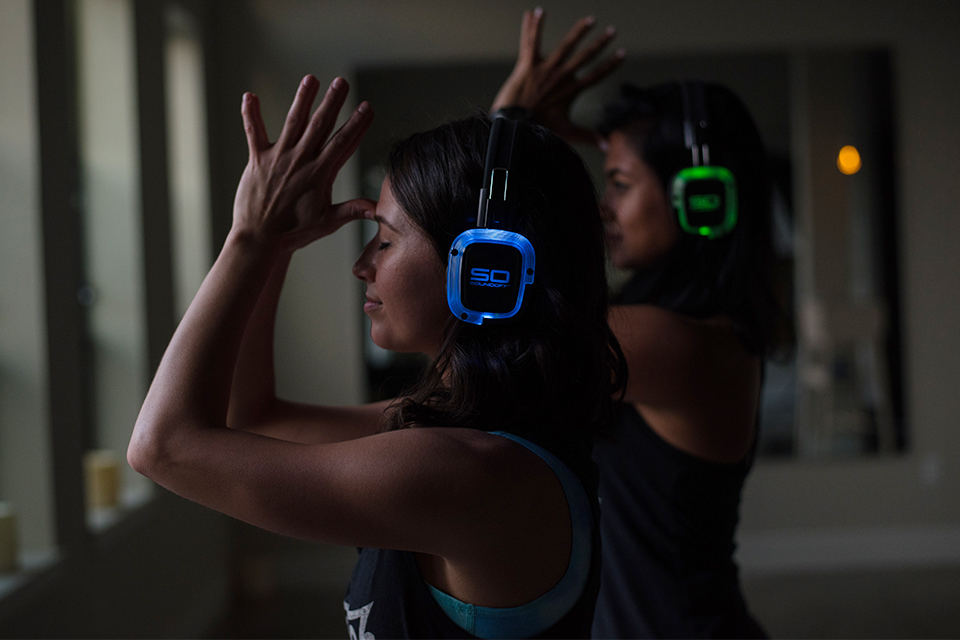Sex, Drugs & Rock 'n' Roll
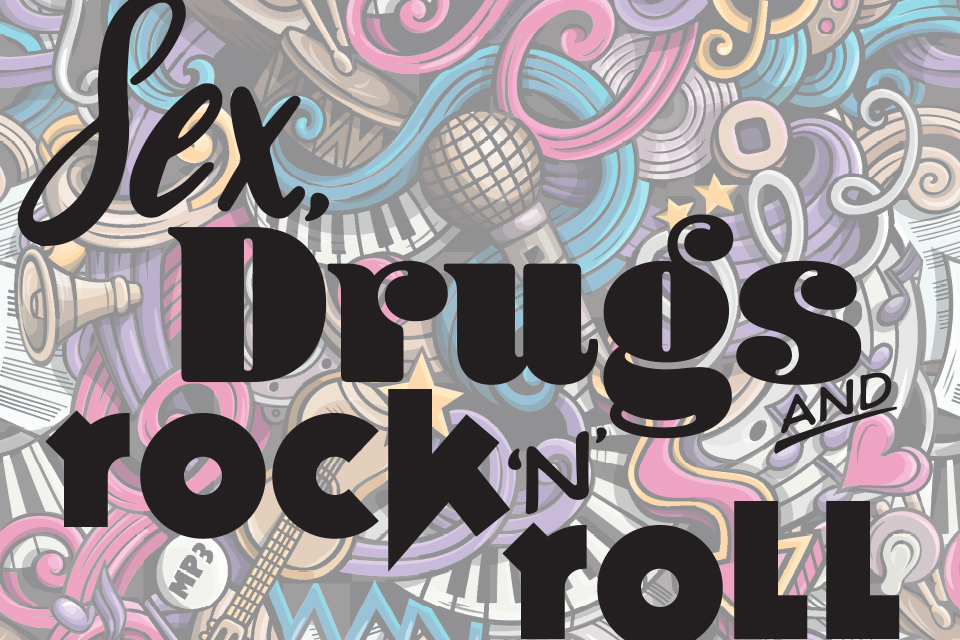
You don’t have to look far to find rock ‘n’ roll in the Live Music Capital of the World. But the sex-and-drugs combination that often follows is different in this city—especially in the fitness and health industry. From sober dance parties, to CBD oil, and finding your next fling at the gym, this is just a mere glimpse at how Austin does sex, drugs, and rock ‘n’ roll.
SEX
Your gym is a hub for great workouts and motivational trainers. Another element commonly found there? Casual sex.
Last year, a study was released saying that half of adults use the gym as a hookup venue and a quarter admit to having sex there. Additionally, 70 percent of women have confessed to fantasizing about their personal trainer. For our Sex, Drugs, & Rock ‘n’ Roll issue, we explored these statistics with real stories and responses from the Austin fitness industry.
In an anonymous survey taken by 70 Austinites, we discovered the following:
15.7 percent have seen hanky panky happening in the locker room
Only 10 percent have gotten busy in the locker room
Of those who had done the deed in the locker room, half of the respondents had a positive experience, half had a negative experience, and one person felt neutrally about it.
About 30 percent reported being physically or romantically involved with their trainer, coach, or instructor.
Nineteen percent said they have switched gyms or workout classes because of a hookup gone wrong.
There’s a way to express interest in someone at the gym. These pickup lines are not it. We asked for the worst of the worst, and this is what our readers gave us:
“Stop doing bench press, your tits are big enough.”
“Deadlift this penis.”
“I like your glasses. You look smart.”
"Hey, you're really good at that. What do you call that?" "A kettlebell swing."
“Your thighs could break a watermelon.”
“It's hot outside but you make it hotter in here.”
“Can you show me how you get so hard?
Do sex and fitness go together? Proceed with extreme caution because it can end in happily ever after or create a cringe-worthy situation. Our readers’ stories can attest to that:
Netflix and Chill…But Seriously
I matched with a guy—we'll name him Ted—on a app, and we ended up meeting downtown one night and then hooking up afterwards. I hadn't seen Ted in months but we’d occasionally text and chat on the app. A few months later, I decided to sign up for a gym membership and on my first day, we ran into each other. I was nice and cordial but it was still extremely awkward. Mainly because our coach wanted to know how we met–and I couldn't bring myself to say it was through a hookup app. He asked to hang out a few days later, and even though I was casually seeing someone else, it wasn't serious. I think he had other expectations because when he came over and realized that I just wanted to eat pizza and watch TV, he looked extremely disappointed—and made it even more awkward. I continued to go to the same gym because it wasn’t weird enough to give me reason to leave. About two months later, I entered into a serious relationship, and I decided it'd be best if I left the gym. I don’t consider myself a jealous person, but if my partner was going to a gym where he worked out daily with someone he had slept with, I wouldn't want him there. On top of that, I was getting tired of being asked how Ted and I knew each other.
Sexy Sweat Session
After a sweaty round of bleacher sprints on a Saturday morning, my guy and I snuck into the (empty) girls’ locker room for some AC and water. Our adrenaline was still pumping, and next thing you know I've added a 'unique setting' to my list. The guy didn't last, but my desire for unusual places did!
Worth the Weight
I owned a small group training gym back in Nebraska. One day a woman walks in and after a month of her joining, we started dating. Good thing she paid six months up-front because I probably wouldn't have kept charging her! I sold my gym and moved down to Austin with her and we just got married last October. Sometimes you cross the client/trainer barrier when you know she is the "one."
Making AMRAP with Clients
I started hooking up with my coach after we matched on Bumble. It turned out that he'd been sleeping with multiple girls at the gym and telling them all the same sad story about moving to Austin— that his family had "disowned" him, so he was forced to live out of his car for two months (which was really maybe one night). It became even more dramatic when he threw out the suicide scare in response to being called out for sleeping with multiple girls and lying to them all. Side note: He also matched with my roommate on Bumble and tried dating her—not knowing she was my roommate. I recently left the gym and he's still doing the same BS with the new crowd of girls.
Nama-stay Away
I met a guy at a yoga studio and he seemed like a good kid. We started hanging out but everyone kept warning me that he was a "huge player" and made his rounds. He seemed genuine so I decided to give it a shot and see what was up. A few, "Sorry I fell asleep" texts later, and it turned out he was a player indeed. I found out that he was banging a girl at the same yoga studio and apparently hanging out with many more. We're still friends.
Love Triangle
About a year ago, I joined a new gym and hit it off with a girl who was also a member. It didn’t take us long to explore the sexual tension between us. Although she was single, there was another guy at the gym that liked her and pretty much thought he had claim over her. He ended up getting really pissed about the whole situation, and made it known in a very passive aggressive way. (With the exception of the time he told her she was "tainted" after sleeping with me.) The girl and I stopped hooking up and I joined a new gym. From what I’ve heard, though, they’re still playing that same tired game.
Sprint Away
We were both members of Castle Hill Fitness, but after our relationship ended—very badly—I stopped going to avoid an awkward run-in!
DRUGS
As cannabis culture extends across the country, there’s a growing buzz around the use of cannabidiol as a method for recovery.
by Lauryn Lax
The legalization of cannabis—commonly known as marijuana—has been a controversial debate in the news and politics now for a number of years.
To date, 26 states have passed the use of marijuana, namely for medical purposes and many have decriminalized its use altogether. Eight of these states (Alaska, Colorado, California, Massachusetts, Maine, Oregon, Washington and Nevada) and Washington D.C. now legalize marijuana purely for recreation, with most allowing residents to possess up to one ounce and some approving of growing plants at home.
Is Texas on the map? Not quite yet. Since the end of the 2017 Texas Legislative session this summer, marijuana still remains illegal to produce, possess, use, or sell statewide, with the denial of House Bill 334.
However, while marijuana is illegal in the Lonestar State, CBD oil is legal.
In fact, many folks within the health, fitness, and wellness community, are using CBD oil as a healing and recovery agent between workouts or for injuries.
Should you use CBD oil? Here’s all you need to know:
Q. What is CBD Oil?
Cannabidiol, or “CBD,” is one of the 85 active compounds found in the marijuana plant, cannabis. CBD oil is known as an analgesic supplement for its anti-inflammatory properties and is sold legally over the counter nationwide—and is not classified as a drug by the FDA.
Q. How is CBD oil different than standard marijuana?
Unlike THC, the active compound in cannabis known for its psychoactive properties, CBD is not psychoactive. It doesn’t produce a feeling of being high, and it can actually counteract that feeling.
Q. What kind of effects does it have on the body?
CBD activates cannabinoid receptors within the brain, reducing inflammation and decreasing stress—including regulating blood sugar levels, restoring circadian rhythm imbalances, and reducing pain and anxiety.
Since supplemental CBD is not psychoactive and it is a natural anti-inflammatory agent, CBD oil is primarily used to promote physical homeostasis (body balance); injury, musculoskeletal and illness support; pain relief; and address HPA-Axis Dysfunction (i.e. “adrenal fatigue” or chronic stress).
Q. Why would I want to take CBD oil?
Since CBD has a strong (positive) effect on inflammation, stress, and the immune system, it can be used to decrease muscle soreness post-workout, calm stress levels and support quality sleep, treat muscle pain or injuries (sprains, tears, broken bones) and decrease stress levels or adrenal fatigue symptoms.
Have you ever taken an aspirin to relieve muscle pain or Tylenol if you have a headache? CBD oil works much the same way. In fact, the largest survey on Cannabidiol or CBD usage to date found that those who started using CBD oil were likely to drop their traditional medicines altogether. Additionally, since CBD oil is a naturally derived compound, its anti-inflammatory properties are not toxic to the body (like NSAIDS). Meds such as Advil and Aspirin are known to actually stall the healing and recovery process and promote unhealthy bacteria growth in the gut microbiome.
Aside from injury or pain healing, CBD oil is also great for general post-workout recovery, balancing your circadian rhythms and promoting alertness after missing out on a night of quality sleep, reducing anxiety, or balancing blood sugar levels (on days when you eat a little more sugar than you intend). CBD oil has also been used successfully as a treatment in individuals with inflammatory bowel disease (IBS), diabetes, chronic pain, migraines, muscle spasms, oxidative stress, and neuropathic pain.
Q. Does CBD oil show up on a drug test?
No. Studies have shown it does not show up on a drug test.
Q. Why do people still want or need “medical marijuana” if CBD oil is legal and safe to use?
The best way to explain this is from the mind versus body perspective. Cannabis extracts containing either THC alone or a combination of THC and CBD have been shown to be effective at reducing pain (mental and physical) from a number of chronic conditions, as well as providing relief from many side effects of disease, including spasticity, pain, nausea, and loss of motor function and control. In short: THC helps numb the pain from the brain's perspective, while CBD helps calm inflammation. Medical marijuana has been prescribed for various diseases and ailments including multiple sclerosis, IBS, cancer, PTSD, anorexia, and AIDS.
Q. What’s the best way to consume CBD oil?
CBD oil can be consumed either topically as a cream, as an oil or dietarily (in oil form), as a supplement. Before you build up to the recommended serving size or guess how much you need, it’s always good to start with less to gradually acclimate your body to any changes you make in your health and supplements.
If you know you are sensitive to supplements and over the counter drugs like aspirin and acetaminophen, consider starting with two to four drops at a consistent time of day and check in with yourself to see if you notice any positive changes. If so, then voila, you’ve found your just-right dose. If not, then “up your game” by either doubling this initial amount or by using the same amount taken twice daily. Then, keep this pattern consistent for seven days. If you are using CBD oil to promote better sleep, ingesting the CBD-rich tincture or extract a few hours before bedtime (not right before bedtime but a few hours before) has a balancing effect that facilitates a good night’s sleep.
Q. What are the harmful or negative side-effects of taking CBD oil?
CBD oil is generally safe and negative side effects (if any) are typically mild, but like anything else, too much of a good thing is not always a good thing. Too many sweet potatoes? You may feel like a potato. Too much working out? Your body gets stressed. Too much CBD oil? Side effects may include: mild and included hypotension [low blood pressure], dry mouth, psychomotor slowing [slowed thoughts or movements], and lightheadedness. Stick to aforementioned dosing instructions for integrating CBD oil slowly, and as always, check with your healthcare provider prior to commencing a new supplemental or medical treatment if you are unsure.
Where can I find it?
CBD oil is becoming more present on the internet. In fact, if you Google search “buy CBD oil” you’ll yield about 12,000,000 different results.
1. You get what you pay for. The higher the concentration of CBD in a product, the more powerful its effects, and that often comes with a little bit of a difference in cost breakdown.
2. Ensure your oil is non-psychoactive. True CBD oil should be non-psychoactive.
3. Don’t fall for “cure-all” products. Stay away from CBD oils that claim to be the cure to everything—from digestive distress and stress, to stubbed toes, to the common cold and flu, and migraines. Highly marketed products may be trying to just earn your dollars, and may not necessarily be the “best” formula on the market. Since there is still more research to be done on CBD oil, don’t consider it the magical cure for everything. Treat it like an anti-inflammatory and de-stressing agent.
Some reputable companies include:
Jambo Superfoods
Charlotte’s Web
The Fay Farm
Tasty Hemp Oil
Entourage
And, locally, Austin Vape & Smoke
ROCK 'N' ROLL
The Live Music Capital of the World seamlessly fuses fitness with sound.
by Carrie Barrett
Rhythm is defined as, “The flow of music through time.” It’s poetic in those terms, right? Even, dare I say, rhythmic? So, too, is Austin. Our town has certainly created its own rhythm through the years, influenced mostly by history, culture, climate, and lifestyle. Sometimes that rhythm is upbeat. Other times it’s melancholy, but it’s always uniquely Austin.
We’re known for many things here in the ATX, but we're namely world-renowned for our music and fitness scene. Both serve to inspire, motivate and break down cultural barriers.
Here are local fitness professionals and businesses who have combined music and fitness in order to enhance personal relationships and create transcendent experiences that inspire confidence, creativity and community.
Kaysha Patel • Stretch Yoga • Stretch Soundscapes
Owner and teacher Kaysha Patel aims to break down yoga’s “intimidation” factor by creating a happy, uplifting space. Through Stretch Yoga’s Stretch Soundscapes class, the power of music and yoga collide to create a unique and heart-opening experience.
What role does music play in your classes?
All Stretch yoga classes and events are accompanied by music. The music is purposefully crafted to accompany the flow of the yoga class, which means it supports grounding in the beginning, stimulates energy in the middle during the more rigorous parts, and induces relaxation at the end during meditation. Music is also a powerful tool for staying in the present moment–because sound itself always occurs in the present. The practice of staying present is a fundamental element in yoga.
Another role that music plays is that it makes yoga enjoyable! We believe fitness should be fun so people continue to practice on a regular basis.
What is your unique Stretch Soundscape Series?
Stretch Soundscapes is a unique experience that embodies the true spirit of Austin–music, fitness, and the outdoors. Stretch Soundscapes classes are yoga classes using the technology of silent disco headphones. The noise cancelling headphones allow the students to become deeply immersed in the music and the teacher’s instruction without external noise distractions. The music is a set list by a live DJ, created to accompany the flow.
We are the only yoga studio in Austin to host yoga with headphones events!
Why is having music at your classes important to you?
Music is a way for the teacher to connect deeper with students. Choice of music (genre or style) is a personal preference and each teacher brings their unique approach. Students get a chance to know the teacher a bit better and relate to them based on their musical preferences. The connection between the teacher and the student grows deeper as they bond over the music and playlists.
What do you think it says about you and your goals?
Music makes fitness enjoyable and when fitness is enjoyable, people want to do it regularly. We want to make yoga a regular part of one’s life. Practicing regularly is the most important aspect of yoga, and I would argue, any type of fitness. If music makes practice more enjoyable and people want to come back, well, then our goal is reached.
Austin is known for two things—fitness and music—and you encapsulate all of it. Why is this important to you?
We are a local studio, and we want to represent Austin in the best way possible. We are proud to embody two elements that bring people to Austin or make people proud to be an Austinite.
What has music given you as a fitness professional?
Music has given me the ability to express inner creativity. Spending time listening to new music and making playlists to accompany my classes has tapped into my creative spirit. Coming up with new ways to incorporate a universal love of music with yoga has been a dream come true.
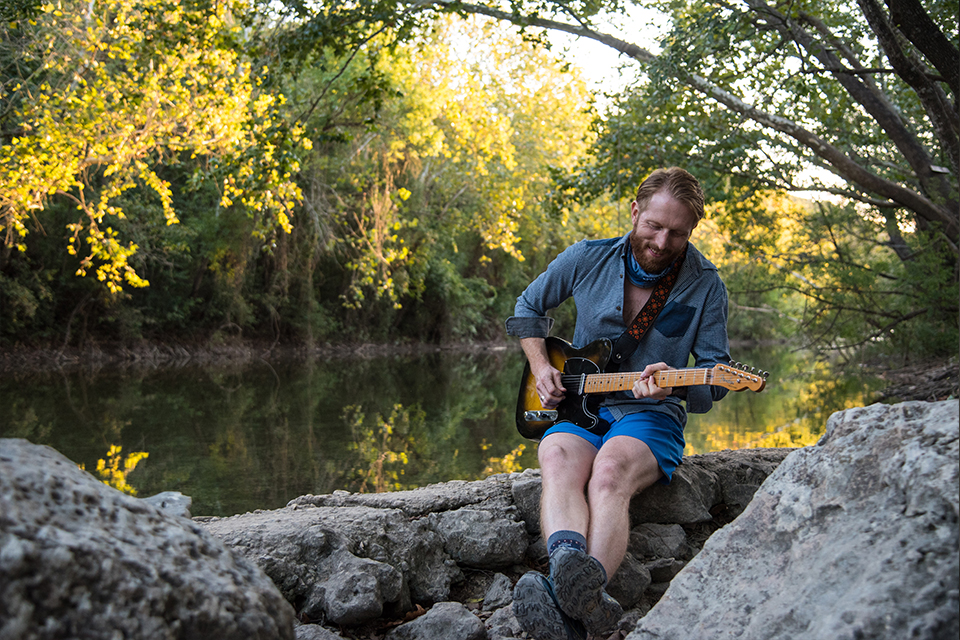
Hair styled by Alissa Shores
Allen Daniell • Songwriter/Musician • Spectrum Trail Racing
Allen Daniell is a lifelong musician who brings his talents on the bass. He often performs at the finish line and post-race cooldown area of Spectrum Trail Racing events held around the outer Austin area. Daniell is also a competitive runner and sponsored member of the Spectrum Trail Racing team.
Is it scripted music (set list), or more organic?
I think my style of music generates a more organic crowd because my sound isn't as commonly found in Austin. I like to start off with a set list for the purpose of structure, but leave room for changes if needed.
What type of experience do you want for the listener?
As a songwriter/musician, my ultimate goal is to be able to provoke any positive reaction. I think that's what any good musician can strive for.
Why is performing at the Spectrum Trail races important to you?
Being a part of the Spectrum Trail Racing team, I know that [co-owners] Jason and Mallory Brooks value supporting local businesses. That's why you'll find me playing music after running a long race. I find that even through the exhaustion, it revives my energy and soul. I know my fellow racers appreciate the distraction from the pain they endure after these races.
What do you think it says about you and your goals?
I have been playing music since I was 10 years old and that has taught me a level of patience and persistence that most may never understand. Being dedicated to something for most of your life teaches you a strength that can only be gained from sacrifice. That foundation has helped me to never give up in finding a way to better myself both in running and in goal setting.
Austin is known for two things—fitness and music—and you encapsulate all of it. Why is this personally important to you?
I love the challenge, variety, freedom and drive to be better. Fitness and music also motivate me to stay healthy spiritually, mentally, artistically and physically.
How does your band march to the beat of its own drum? Why should people seek it out?
Musically, I think my wife answers this question best. She says she fell in love with me when she saw that my passion for my art was resonating on stage. She could see the joy that it brought me and it was infectious. As for racing, I get to train, be coached, and supported by some amazing people. Spectrum puts a lot of importance in the overall experience of those running their races. They care about the details that most other races overlook. They make the experience fun!
What has music given you as a fitness professional?
Music has been my foundation. The hard work, failures, successes, rejections, and lessons learned have made me stronger and more patient. From a technical standpoint, the practices needed in singing have helped me better my breathing technique when running.
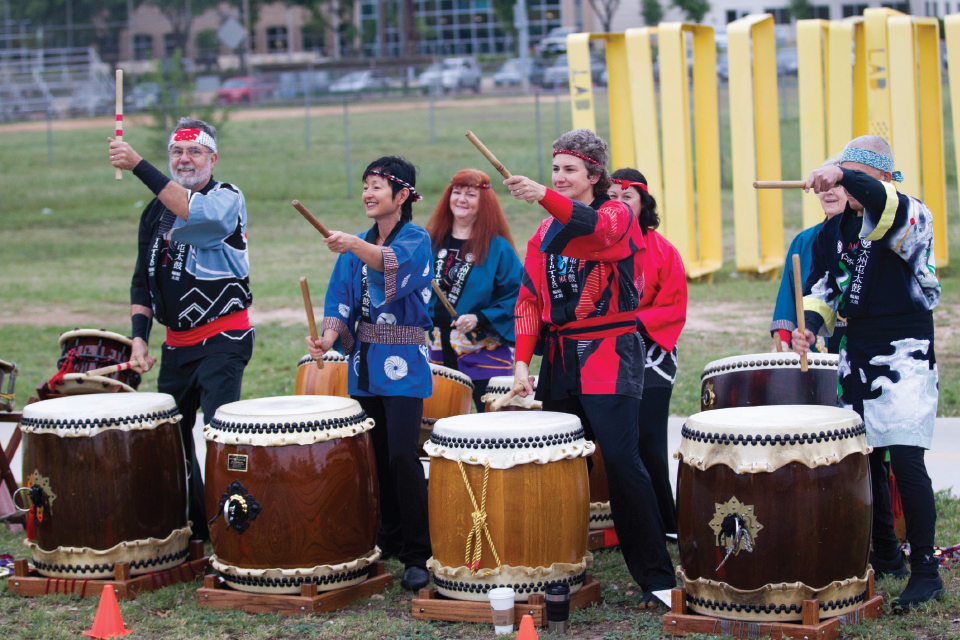
Jeff Simecek • Statesman Cap10K Race Director, Community & Events
The Statesman Cap10K celebrated its 40th race and doesn’t seem to be stopping any time soon. Race director Jeff Simecek made a few changes and additions to the event, but prioritized the “Austin-ness” of it. For example, as the Live Music Capital of the World, this race would be incomplete without live music performances along the course.
What role does music play in your event?
For the Statesman Cap10K, music is used to enhance the experience of the event. The race typically features seven bands (or so) along the course and two bands at the Finish Line Festival to add to the overall fun of the event.
Is it scripted music (set list), or more organic?
The music is completely organic. Bands select their own playlists. I typically select both bands for the Finish Line Festival that play a wide range of music and differ from each other. As an example, at the 40th race on April 23, the opening act was Rochelle and the Sidewinders, named “best blues band” in Austin. The headliner was Tomar and the FC’s, who played funk and retro. In 2016, we featured Quiet Company and The Nightowls.
What type of experience do you want for the listener or athlete?
We want a total party experience for the runner/participant. Music along the course is designed to encourage runners; music at the festival is to celebrate crossing the finish line.
Why is having music at your event important to you?
It’s important to me personally as it adds a level of fun to the overall experience with a party atmosphere. Music inspires people, especially when they are working to meet a goal, so having many different types of music can raise an event to the next level of fun.
What do you think it says about you and your goals?
My goal is to put on a safe, fun race that makes people want to sign up for the next one as soon as they get home. Music adds to the overall atmosphere.
Austin is known for two things—fitness and music—and you encapsulate all of it. Why is this important to you?
The Cap10K celebrated its 40th running on April 23. It was my goal this past year and every year, actually, to put on the best race ever. Each year, we try to raise the bar as we grow the Cap10K—the largest 10K in Texas. The 40th featured more than 21,500 registrants.
How does your event march to the beat of its own drum? Why should people seek it out?
As Austin grows and changes, my goal is to keep the Statesman Cap10K true to its original mission, which is to provide an event with a uniquely Austin experience. How many events have an armadillo as their mascot? Dash the Dillo was created by Ben Sargent, a former Statesman editorial cartoonist, for the very first race in 1978. Dash has been modified a few times since the early days, but we’re proud he’s still a huge part of the Cap10k.
What has music given you as a fitness professional?
Encouragement and determination. Nothing is better than a great playlist as you train for the race
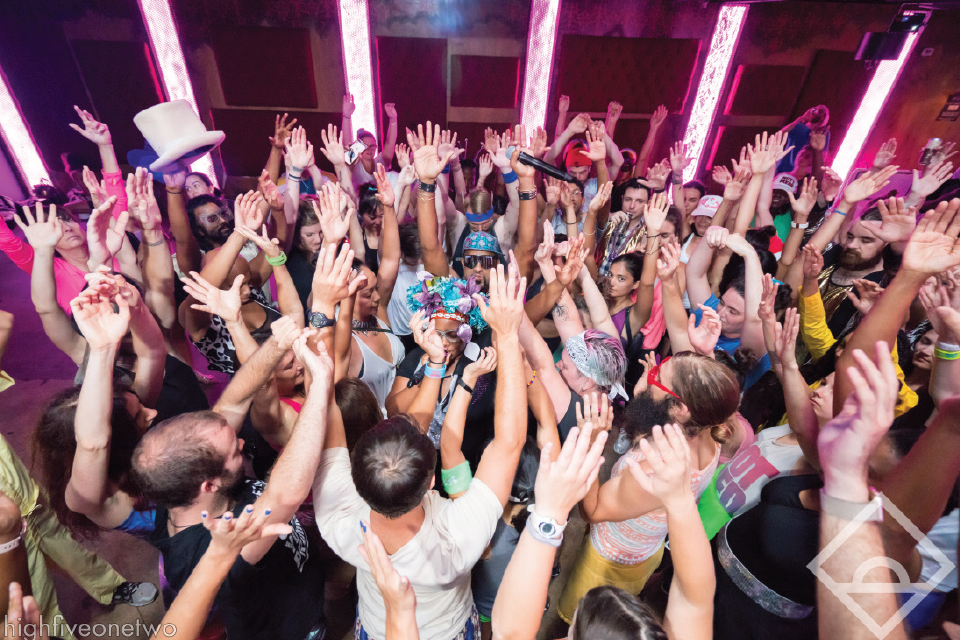
photo by highfiveonetwo
Jonathan 'Chaka' Mahone • Austin Daybreaker Organizer
Daybreaker, as a whole, was founded on the premise that each event releases some very important chemicals in the brain that contribute to our overall happiness and sense of well-being. They call it the 'daily DOSE:' an acronym for Dopamine, Oxytocin, Serotonin, and Endorphins. Dopamine is the chemical that gets released when we accomplish goals, oxytocin relates to touch and connection, serotonin is connected with feelings of euphoria and 'spiritual' experiences, and endorphins are all about that 'pump' you feel after a good workout/physical push.
What role does music play in your event?
Music is the heart of Daybreaker events. It sets the tone and mood for the experience. We have guest DJs at each party that have their own unique 'voice,' providing the soundtrack for our yoga/movement class (6 a.m.), and our dance party (7-9 a.m.). We also have guest musicians that come in and accompany what the DJ is doing throughout the experience—everything from New Orleans style brass bands, concert violinists, soulful vocalists, and live percussionists can get in on the action at any moment. The collaboration of live instrumentation with the recorded music is really fun and invigorating! It's also a great opportunity for the crowd to connect with some of Austin's extremely talented local artists.
Is it scripted music (set list), or more organic based on who arrives?
It's 'organically scripted.' We have our plans for the flow of the event, and the creation of 'wow moments' for our attendees, but things always change based on many factors within the moment!
What type of experience do you want for the attendee?
On a personal level, I want to see: a rejuvenating kind of 'workout' experience that gets everyone up and moving together, and a transformative 'connection/community' experience that makes everyone acutely aware of our unity and one-ness regardless of socially constructed 'differences.'
Why is having music/dance at Daybreaker important to you?
It's important to me because movement opens your heart. When you dance, you are free. In that moment, you can forget about everything, and just 'be' in your body. If your heart is open, there's a chance for deeper self-discovery. There aren't many opportunities or spaces that encourage this fully. At Daybreaker, there are no drugs or alcohol, so the movement is more connected with personal expression and is less about showing off. The music sets the intention for the body's movement.
What do you think it says about you and your goals?
As one-half of award-winning hip hop duo Riders Against the Storm, one of our main goals is healing through art and music. We started a monthly dance party with DJ Chorizo Funk called Body Rock ATX seven years ago. It is very similar to Daybreaker, except it's at night. We also have an annual festival: RAS DAY Fest that celebrates and honors many of the same values as well. My goal is to continue creating spaces that allow for deeper human connectivity through each of these outlets and more.
Austin is known for two things—fitness and music—and you encapsulate all of it. Why is this important to you?
Fitness and music are universal themes, but are also very personal and individual. There aren't many spaces that bring so many elements and communities into one space. At Daybreaker, we have the yoga, dance, fitness, and music communities all intersecting and interacting at once. It breaks down the idea that you have to go to a place for yoga, a place for a workout, a place to hear a world-class DJ, another place to hear some LIVE music. This is important to me because it represents a holistic experience, rather than an isolated one. Each community, on its own, trends towards homogeneity, but as a producer, I strive to attract as diverse and heterogeneous a community as possible.
How does your event march to the beat of its own drum? Why should people seek it out?
People should come to this event because the experience will open up parts of you that you may have forgotten even existed. It will connect you with new people, and give you a greater sense that we are truly all in this together. Our daily lives can be extremely isolating. We sit in our cars in traffic, at cubicles/computers; we stand in line at the grocery store, deep down just waiting, hoping, praying for something spontaneous to erupt out of the monotony. Daybreaker symbolizes that monthly break in the daily grind that wears us down and out as humans. We need reminders that we are not alone in our need for healthy, authentic connection.




